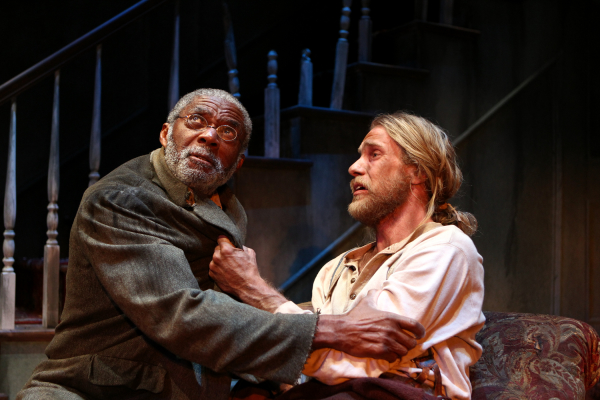The Whipping Man

(© Debora Robinson)
The word "reconstruction" takes on an entirely new meaning within the unique framework of The Whipping Man, Matthew Lopez's drama set in the days immediately following the end of the Civil War. While it is hardly unusual to watch the interplay between white plantation owners and their newly freed slaves, witnessing this dynamic unfold against the backdrop of a Passover seder is something else entirely.
The revival of Lopez's 2006 play — directed by Martin Benson at the Pasadena Playhouse following a run at South Coast Repertory — is shot through with introspection both personal and historic. Set in a crumbling mansion and boasting a towering performance by Charlie Robinson, this Whipping Man grabs its audience and never lets go.
As thunderclaps and flashes of lightning illuminate the once-opulent DeLeon home in Richmond, Virginia (set designed with crumbling resplendence by Tom Buderwitz), Caleb DeLeon stumbles into the new deserted house and falls on his face. Not exactly the homecoming that this wounded Confederate soldier (played by Adam Haas Hunter) envisioned. He is ministered to by Simon (Robinson) one of the estate's last remaining slaves, who quickly determines that Caleb's gangrenous leg will have to be amputated. The arrival of another former slave, John (Jarrod M. Smith), who has been out looting, is fortuitous. Caleb refuses to go to a hospital, and the amputation is a two-person job.
That opening scene, which begins with grand, gothic-style thunderclaps, concludes with Simon's saw drawing the first blood from his patient's leg and Caleb's screams echoing out through the darkness. Given the personal turmoil all three of our men are facing, the grand drama is just getting started. Benson and his cast set the tone from the first beat, and never let up.
The other members of the DeLeon family — black and white — have long since fled. Most of the palatial estates in Richmond now sit empty and abandoned, easy targets for John to ransack for food, whiskey, and anything else he desires. General Lee may have surrendered, and the war may be over, but nobody quite knows what any of this means, and the news trickling in over the course of these three days in mid-April 1865 further clouds the picture.
Caleb and John, who have been friends since boyhood and who grew up in the same house, are both wanted men. Simon watches over the welfare of the two younger men with an air of paternal care, but he also has his own wife and daughter to find. What's more, it is currently Passover, the holiday celebrating the Jews' liberation from slavery, and a regular rite within the DeLeon house. Simon is hell-bent on celebrating, infusing the choruses of "Go Down, Moses" with an extra jolt of exultation. Caleb will lift a glass as well, but he is less bullish. The war has severely tested his faith.
The complicated bonds linking Caleb and John are eventually explained and are not hugely surprising. That they have been reunited and are now largely dependent on each other is plenty ironic, but family life can take people down some twisted paths. Hunter and Smith both do solid character work here, embracing the tension and the rediscovery of childhood bonds that even a great war could not entirely sever.
But it is Robinson's Simon who is the production's beating heart. Whether brandishing a gun or a lantern, preparing a whiskey bottle or a seder plate, he infuses this proud man with dignity and adaptability. As is the case with Caleb and John, Simon will face shocking, even life-changing, revelations. Robinson will receive shattering news of "Father Abraham" and the fate his family members with the stoicism of a man who has borne many blows. But Robinson also conveys Simon's belief that a new day in this new United States of America also comes with fresh aspirations.
Though all three men have faced physical, mental, and emotional wars, their resilience shines through. By the close of The Whipping Man, Simon, John, and Caleb all know that, much like the reconstruction of their country, hope for their individual futures is on the horizon.











